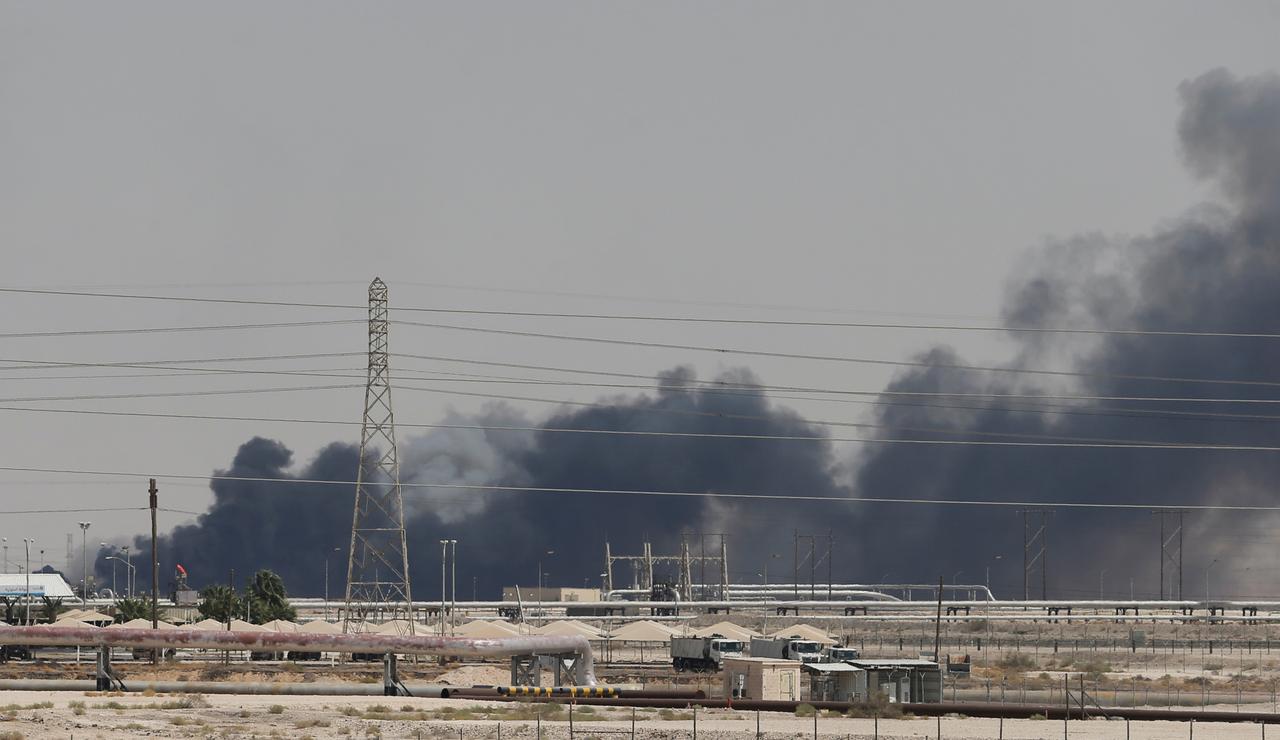Iran Rejects US Claim It Was Behind Saudi Oil Attacks, Says Ready For War
DUBAI– Iran rejected accusations by the United States that it was behind attacks on Saudi oil plants that risk disrupting world energy supplies and warned on Sunday that U.S. bases and aircraft carriers in the region were in range of its missiles.
Yemen’s Houthi group claimed responsibility for Saturday’s attacks that knocked out more than half of Saudi oil output or more than 5% of global supply, but U.S. Secretary of State Mike Pompeo said the assault was the work of Iran, a Houthi ally.
The drone strikes on plants in the heartland of Saudi Arabia’s oil industry, including the world’s biggest petroleum processing facility, were expected to send oil prices up $5-10 per barrel on Monday as tensions rise in the Middle East.
Iranian foreign ministry spokesman Abbas Mousavi dismissed the U.S. allegation as “pointless”. A senior Revolutionary Guards commander warned that the Islamic Republic was ready for “full-fledged” war.
“All American bases and their aircraft carriers in a distance of up to 2,000 kilometers around Iran are within the range of our missiles,” the semi-official Tasnim news agency quoted commander Amirali Hajizadeh as saying.
State oil giant Saudi Aramco said the attack cut output by 5.7 million barrels per day, at a time when Aramco is trying to ready itself for what is expected to be the world’s largest share sale.
Aramco gave no timeline for output resumption. A source close to the matter told Reuters the return to full oil capacity could take “weeks, not days”.
Another source briefed on the developments said Saudi oil exports would continue to run as normal this week thanks to large storage in the kingdom.
But it remains unclear how long the oil production shut down will continue, because the damage to the infrastructure “was big” and could not be fixed overnight, the source added.
Traders and analysts said crude may spike to as high as $100 if Riyadh fails to quickly bring back supply.
The kingdom, the world’s top oil exporter, ships more than 7 million barrels of oil to global destinations every day.
Riyadh said it would compensate for the loss by drawing on its stocks which stood at 188 million barrels in June, according to official data. The United States said it was also ready to tap emergency oil reserves if needed.
The Saudi bourse closed down 1.1% with banking and petrochemical shares taking the biggest hit. Saudi petrochemical firms announced a significant reduction in feedstock supplies.
“Abqaiq is the nerve center of the Saudi energy system. Even if exports resume in the next 24-48 hours, the image of invulnerability has been altered,” Helima Croft, global head of commodity strategy at RBC Capital Markets, told Reuters.
“UNPRECEDENTED ATTACK”
According to U.S. government information, 15 structures at Abqaiq suffered damage on their west-northwest facing sides.
Pompeo said there was no evidence the attack came from Yemen, where a Saudi-led coalition has been battling the Houthis for over four years in a conflict widely seen as a proxy war between Saudi Arabia and Shi’ite Muslim rival Iran.
“Amid all the calls for de-escalation, Iran has now launched an unprecedented attack on the world’s energy supply,” he said.
Some Iraqi media outlets said the attack came from there. Baghdad denied this on Sunday and vowed to punish anyone using Iraq, where Iran-backed paramilitary groups wield increasing power, as a launchpad for attacks.
Kuwait, which borders Iraq, said it was investigating the sighting of a drone over its territory and coordinating with Saudi Arabia and other countries. The cabinet said the prime minister ordered tighter security at vital installations.
Riyadh accused Iran of being behind previous attacks on oil pumping stations and the Shaybah oilfield, charges Tehran denies. It has not yet blamed any party for Saturday’s strike, but linked it to a recent series of attacks on Saudi oil assets and crude tankers in Gulf waters.
Riyadh says Iran arms the Houthis, a charge both deny.
Regional tensions have escalated since Washington quit an international nuclear deal and extended sanctions on Iran.
U.N. Secretary-General Antonio Guterres condemned Saturday’s attacks and called on all parties to exercises restraint and prevent any escalation.
The European Union warned that the strikes posed a real threat to regional security, Britain called them a “reckless attempt” to disrupt global oil supplies and France said such actions could only worsen “risk of conflict”. Iran’s ally Turkey called for the avoidance of “provocative steps”.
U.S.-IRAN TALKS
The attack comes after U.S. President Donald Trump said a meeting with Iranian President Hassan Rouhani was possible at the United Nations General Assembly in New York this month. Tehran ruled out talks until sanctions are lifted.
White House adviser Kellyanne Conway did not rule out a possible meeting between the two but told “Fox News Sunday” that the strikes “did not help” that prospect.
Saudi de facto ruler Crown Prince Mohammed bin Salman told Trump that Riyadh was ready to deal with “terrorist aggression”.
The Saudi-led coalition has responded to past Houthi attacks with air strikes on the group’s military sites in Yemen.
The conflict has been in military stalemate for years. The alliance has air supremacy but has come under scrutiny over civilian deaths and a humanitarian crisis that has left millions facing starvation. The Houthis, more adept at guerrilla warfare, have increased attacks on Saudi cities, thwarting peace efforts.
The United Arab Emirates, Riyadh’s main partner in the alliance, has reduced its presence in Yemen due to concern over rising Iran tensions and Western criticism of the war, leaving Riyadh to try to neutralize the Houthi threat along its border.
Iran’s foreign minister Mohammed Javad Zarif said Washington and its allies were “stuck in Yemen” and that blaming Tehran “won’t end the disaster”.
SOURCE: REUTERS

